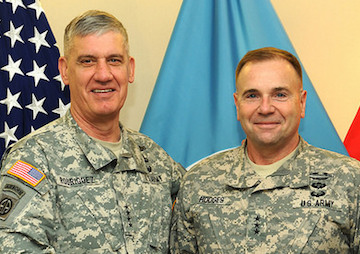The Numbers Racket: U.S. Africa Command Clams Up After Contradictory Statements to Congress
Somehow, between 2015 and 2016, more than 200 AFRICOM missions from 2014 simply vanished. And the Senate Armed Services Committee apparently hasn't bothered to ask for clarification. Gen. David Rodriguez, commander of AFRICOM, left, with Lt. Gen. Ben Hodges, commander of U.S. Army Europe. (U.S. Army Europe / (CC-BY-2.0))
1
2
3
Gen. David Rodriguez, commander of AFRICOM, left, with Lt. Gen. Ben Hodges, commander of U.S. Army Europe. (U.S. Army Europe / (CC-BY-2.0))
1
2
3
Rodriguez could, for example, have been provided with faulty numbers by subordinates or the command might have altered the way it tracks missions. If, however, Rodriguez intentionally manipulated the numbers to deceive Congress, he broke the law, according to Andrew McBride, who served in the Department of Justice for a decade and is now a partner with the Washington D.C.-based law firm of Wiley Rein. “If he has a reason to do it and he knows what he’s doing, that is perjury. That is willfully lying under oath,” says McBride. And under Section 1001, a person does not even have to be under oath for the federal government to bring a false statements charge. It’s enough for an individual to provide false information with an intent to deceive a federal agent or entity.
There is, as yet, no evidence that Rodriguez violated the law, but should he find himself in hot water, it would not be a first for an AFRICOM chief. Just after Rodriguez was nominated to take the helm of AFRICOM back in 2012, its first commander, General William Ward, was demoted as he was retiring from the military and ordered to repay the government $82,000 for lavish spending on the taxpayers’ dime.
On the eve of his own retirement, Rodriguez now finds himself the subject of scrutiny, with his subordinates stonewalling requests for comment. Numerous emails sent to AFRICOM spokesman Lieutenant Commander Anthony Falvo — including those with a subject line indicating a request to interview the AFRICOM chief — were, according to automatic return receipts, “deleted without being read.”
At a time when the number of U.S. troops, bases, and — perhaps — missions in Africa are increasing, along with the number of terrorist groups and terror attacks on the continent, hundreds of already murky missions have apparently been disappeared, purged from the command’s rolls and the historical record. As troubling as this may be, the stakes go far beyond numbers, says the Security Assistance Monitor’s William Hartung. Precise figures about foreign military engagements are essential in a world where blowback from military operations is an ever-present reality, but they are only a first step.
“Providing accurate public information on what U.S. troops are doing would at least provide early warning of what might be to come, and allow for scrutiny and accountability,” he points out. “Not only should AFRICOM report the number of activities, but there should be some description of what these activities entail. Arming and training missions can escalate into more substantial military involvement.”
Nick Turse is the managing editor of TomDispatch, a fellow at the Nation Institute, and a contributing writer for the Intercept. He is the author of the New York Times bestseller Kill Anything That Moves: The Real American War in Vietnam. His latest book is Next Time They’ll Come to Count the Dead: War and Survival in South Sudan. His website is NickTurse.com.
Follow TomDispatch on Twitter and join us on Facebook. Check out the newest Dispatch Book, Nick Turse’s Next Time They’ll Come to Count the Dead, and Tom Engelhardt’s latest book, Shadow Government: Surveillance, Secret Wars, and a Global Security State in a Single-Superpower World.
Copyright 2016 Nick Turse Your support matters…Independent journalism is under threat and overshadowed by heavily funded mainstream media.
You can help level the playing field. Become a member.
Your tax-deductible contribution keeps us digging beneath the headlines to give you thought-provoking, investigative reporting and analysis that unearths what's really happening- without compromise.
Give today to support our courageous, independent journalists.






You need to be a supporter to comment.
There are currently no responses to this article.
Be the first to respond.